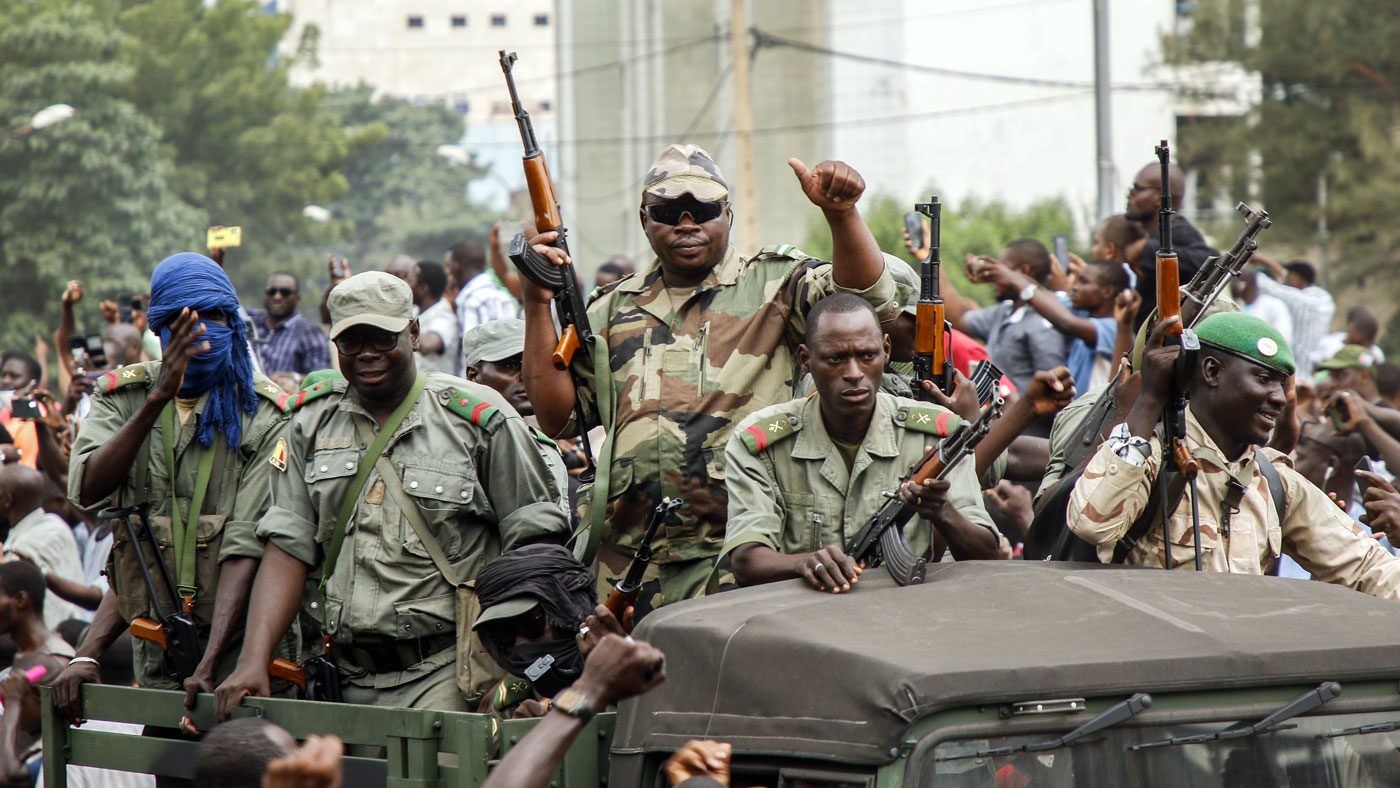Mali coup: why the president resigned
Senior military figures including an air force major-general are now in charge of the West African nation

A free daily email with the biggest news stories of the day – and the best features from TheWeek.com
You are now subscribed
Your newsletter sign-up was successful
Mali appears to be under military control today, after the country’s president resigned and dissolved parliament.
President Ibrahim Boubacar Keita announced his departure “hours after the mutineers detained him at gunpoint, plunging a country already facing a jihadist insurgency and mass protests deeper into crisis”, Reuters says.
Both the president and Prime Minister Boubou Cisse were taken to a military camp near Bamako, Mali’s capital, by a group of soldiers calling themselves the National Committee for the Salvation of the People.
The Week
Escape your echo chamber. Get the facts behind the news, plus analysis from multiple perspectives.

Sign up for The Week's Free Newsletters
From our morning news briefing to a weekly Good News Newsletter, get the best of The Week delivered directly to your inbox.
From our morning news briefing to a weekly Good News Newsletter, get the best of The Week delivered directly to your inbox.
Although Keito won a second term in 2018, his rule has been marred by “anger over corruption, the mismanagement of the economy and a dispute over legislative elections”, says the BBC. “It has prompted several large protests in recent months.”
In a televised address this morning, one of the coup leaders, air force deputy chief of staff Colonel-Major Ismael Wague, said that the military would seek to create “the best conditions for a civil political transition leading to credible general elections”.
The uprising is “a dramatic escalation of a months-long crisis” that follows a long civil war “in which ideologically-motivated armed groups have stoked ethnic tensions while jockeying for power”, says Al Jazeera.
The ousting of the government has been condemned by the 15-nation Economic Community of West African States.
A free daily email with the biggest news stories of the day – and the best features from TheWeek.com
“Having previously warned it would no longer tolerate military coups in the region, the bloc plans to send a delegation to Mali to ensure a return to constitutional democracy,” Reuters reports.
Holden Frith is The Week’s digital director. He also makes regular appearances on “The Week Unwrapped”, speaking about subjects as diverse as vaccine development and bionic bomb-sniffing locusts. He joined The Week in 2013, spending five years editing the magazine’s website. Before that, he was deputy digital editor at The Sunday Times. He has also been TheTimes.co.uk’s technology editor and the launch editor of Wired magazine’s UK website. Holden has worked in journalism for nearly two decades, having started his professional career while completing an English literature degree at Cambridge University. He followed that with a master’s degree in journalism from Northwestern University in Chicago. A keen photographer, he also writes travel features whenever he gets the chance.
-
 ‘Restaurateurs have become millionaires’
‘Restaurateurs have become millionaires’Instant Opinion Opinion, comment and editorials of the day
-
 Earth is rapidly approaching a ‘hothouse’ trajectory of warming
Earth is rapidly approaching a ‘hothouse’ trajectory of warmingThe explainer It may become impossible to fix
-
 Health insurance: Premiums soar as ACA subsidies end
Health insurance: Premiums soar as ACA subsidies endFeature 1.4 million people have dropped coverage
-
 Epstein files topple law CEO, roil UK government
Epstein files topple law CEO, roil UK governmentSpeed Read Peter Mandelson, Britain’s former ambassador to the US, is caught up in the scandal
-
 Iran and US prepare to meet after skirmishes
Iran and US prepare to meet after skirmishesSpeed Read The incident comes amid heightened tensions in the Middle East
-
 Israel retrieves final hostage’s body from Gaza
Israel retrieves final hostage’s body from GazaSpeed Read The 24-year-old police officer was killed during the initial Hamas attack
-
 China’s Xi targets top general in growing purge
China’s Xi targets top general in growing purgeSpeed Read Zhang Youxia is being investigated over ‘grave violations’ of the law
-
 Panama and Canada are negotiating over a crucial copper mine
Panama and Canada are negotiating over a crucial copper mineIn the Spotlight Panama is set to make a final decision on the mine this summer
-
 Why Greenland’s natural resources are nearly impossible to mine
Why Greenland’s natural resources are nearly impossible to mineThe Explainer The country’s natural landscape makes the task extremely difficult
-
 Iran cuts internet as protests escalate
Iran cuts internet as protests escalateSpeed Reada Government buildings across the country have been set on fire
-
 US nabs ‘shadow’ tanker claimed by Russia
US nabs ‘shadow’ tanker claimed by RussiaSpeed Read The ship was one of two vessels seized by the US military